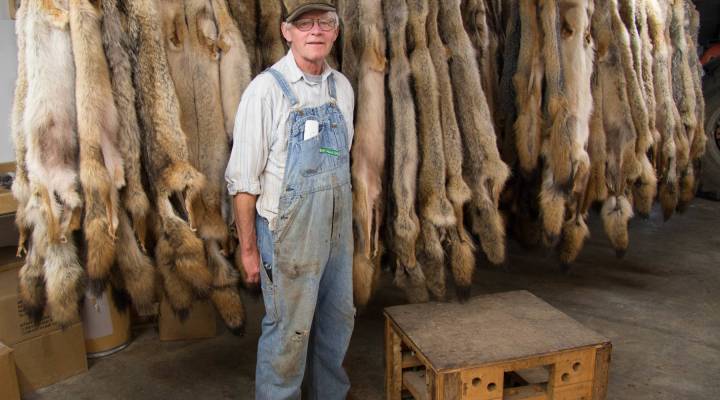
How the global oil price affects a raccoon trapper in Missouri
How the global oil price affects a raccoon trapper in Missouri

Catching raccoon is all about location, and David Schlemeyer is slogging his way to a primo piece of trapping real estate. It’s a little pond in the backwoods on his neighbor’s land outside Columbia, Missouri. Raccoons come here to scavenge food.
“I’ve probably caught seven or eight raccoons right here this year,” he says as he checks his traps. Today, they sit empty.
Raccoons are pests for Schlemeyer’s farmer neighbors; most of the traps he sets are on their properties. Despite the day’s bad luck, he’s caught about 80 raccoon in this year’s trapping season. The question now is what to do with them.
Normally he’d skin and dry the furs and sell them to a fur buyer. But in the past two years, the market for raccoon furs has all but dried up.
“When things are good things are good. When things are bad, it’s bad,” Doren Miller said, a fur buyer in Missouri for over 25 years. Today, he says, things are bad, “real bad.”
Miller’s got 25,000 raccoon furs in freezer storage right now, and he hasn’t been able to sell a single one in two years. There’s a reason the bottom has dropped out of the raccoon market: Russia and its oil-dependent economy.
“We generally buy a lot of oil from Russia,” Miller said. “If we can buy cheap oil from Russia, they’re not going to have the expendable capital to buy fur.”
That’s a problem because Russia is a huge market for raccoon furs. The reason is that raccoon resembles silver fox but comes at a fraction of the price. When the Russian economy took off in the late 1990s, so did demand for fur coats from the country’s emerging middle-class.

One of Doren Miller’s freezers where he is storing about 400 of the roughly 25,000 raccoon furs he has on hand at the moment. He hasn’t sold a single raccoon fur in the past 2 years.
“They were spending money on trips abroad, they were spending money on coffee bars and sushi restaurants. You had this tremendous inflow of wealth over about a decade,” Olga Oliker said, who directs the Russia and Eurasia program at the Center for Strategic and International Studies.
Russia’s growth was slowed during the global recession and came to a screeching halt when oil prices plummeted in the last couple years. Tack on international sanctions over the Crimea conflict, and for the average Russian prices have gone up and salaries have gone down.
“You go into a store and you look around and you can’t afford the things you used to be able to afford,” Oliker said. That means less money to buy a new fur coat.
For a sense of how that’s affecting the raccoon fur market, consider the North American Fur Auction, the largest wild fur seller in the world. As recently as 2013, raccoon furs were selling for an average of about $25 apiece.
This year, they’re averaging about $4.
“It’s really just showing it hit a wall,” Rob Cahill said, the auction’s vice president of marketing. “The market was almost entirely the Russian market, and then once you lose that one market, the game’s up.”
“At this point today, I don’t think I could sell a raccoon pelt to anybody. It’s about as bad as it gets,” Doren Miller said with a chuckle.
“It’ll come around,” he added. “It’ll be good one of these days again. People love fur.”
He and other fur buyers are waiting for the next market to open up. Unsurprisingly, they’ve got their eyes set on China.
There’s a lot happening in the world. Through it all, Marketplace is here for you.
You rely on Marketplace to break down the world’s events and tell you how it affects you in a fact-based, approachable way. We rely on your financial support to keep making that possible.
Your donation today powers the independent journalism that you rely on. For just $5/month, you can help sustain Marketplace so we can keep reporting on the things that matter to you.











